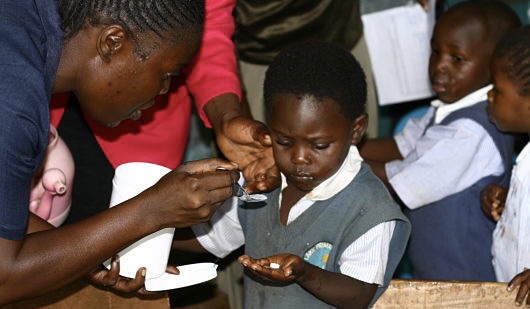Kwara Government Launches Deworming Programme Targeting Over 810,000 School-Aged Pupils

The Kwara government, on Monday in Ilorin, flagged off its deworming programme for 810,267 school-aged children across the 12 Local Government Areas of the state.
Schoolchildren would be administered Mebendazole tablets for the control of Soil-Transmitted Helminths (STH).
In her opening remark, the Kwara Commissioner for Health, Amina El-Imam, described the programme as a vital public health intervention.
Ms. El-Imam, who was represented by the Permanent Secretary of the ministry, Taoheed Abdullahi, stated that STH is one of the most widespread and persistent Neglected Tropical Diseases (NTDs).
According to her, the STH infections are caused by parasitic worms such as:
- Roundworms
- Whipworms
- Hookworms
The Commissioner explained that these worms are spread through contaminated soil, especially in environments with poor sanitation and inadequate hygiene practices.
"Children are the most vulnerable because they play on the ground, walk barefoot, and sometimes eat without proper handwashing," she said.
Ms. El-Imam noted that the World Health Organisation (WHO) identifies STH as one of the most common infections among school-aged children in developing countries.
She observed that these infections often go unnoticed at first because symptoms may be mild, adding that the impact becomes severe, affecting the well-being, development, and academic capacity of children.
She explained that children with worm infections deal with several health problems because the worms steal essential nutrients, vitamins, and minerals from their bodies.
This leads to poor growth, low body weight, and a weakened immune system.
"Hookworms suck blood from the intestinal wall, causing iron deficiency anaemia that leaves children tired, weak, and unable to learn effectively," she said.
Ms El-Imam stated that there is persistent discomfort, which reduces appetite and affects classroom concentration.
According to the commissioner, worm infection increases susceptibility to other illnesses, leading to frequent absenteeism, among others.
She added that long-term infestation slows brain development, affects memory, mental alertness, and academic performance.
"These effects show clearly that worm infections are not just a health issue; they hinder our childrenís ability to grow well, learn well, and thrive," she said.
She noted that the encouraging news is that STH infections are both preventable and easily treatable, adding that deworming with Mebendazole is a safe and effective medicine recommended by the WHO.
Ms El-Imam also describes it as one of the most cost-effective interventions to improve child health.
"Mebendazole eliminates the worms, allowing children to absorb nutrients properly, regain their strength, and grow normally.
"It is safe, easy to administer, and highly effective when provided regularly to school-aged children," she said.
Joy Shuaib, the country director of Sightsavers, a non-governmental organisation, stated that the organisation has been at the forefront of efforts to eliminate NTDs in Nigeria.
Ms Shuaib who was represented by the Kwara State programme manager of Sightsavers, Olalekan Ajayi, said the organisation started its programme on prevention and treatment of eye infections.
She explained that over the years, the organisation has also been active in fighting and eliminating groups of infectious diseases like leprosy, rabies, trachoma, and schistosomiasis.
She commended the state government for its commitment towards the elimination of NTDs and prioritising healthcare in the state.
Ms Shuaib emphasised that the drug is safe and effective for children, while appealing to parents to give their full support to the deworming programme.
The NTDs programme coordinator, Christiana Bamigboye, explained that school children ages five to 14 years carry the highest burden of the disease due to poor hygiene and exposure to contaminated soil.
She said that regular deworming boosts immunity, reduces anaemia, and improves school attendance and concentration.
Ms Bamigboye explained that the treatment would be administered across schools and communities in 12 LGAs.
The representative of the Chief Imam of Ilorin, Shehu Oniyangi, commended the state government for the healthcare intervention.
He described children as future leaders of the country who must be protected, while also encouraging caregivers to support the deworming programme.
(NAN)
Cloud Tag: What's trending
Click on a word/phrase to read more about it.
Balogin Alanamu Abdul-Rasheed Na\'Allah Toyin Olayinka Tejidini Monthly Sanitation Exercise Quareeb Congress For National Consensus Amada Jidda Gwanara Abubakar Imam Ayegbeni Goodluck Jonathan Abdulraufu Mustapha Ilorin Sarafadeen Kayode Akorede Convocation Ceremonies Titus Suberu-Ajibola Oasis Muslim Care Foundation Unilorin FM Ilorin Central Mosque Jare Olatundun Rueben Parejo Haliru Yahaya Yemi Osinbajo Read With Me Haliru Dantoro Kwara North Sabi Senate Muyideen Ajani Bello Adamu Atta Adebara Alfa Belgore AbdulGaniyu Kareem Royal FM Clement Yomi Adeboye Budo-Egba Senate Presidency Taofik Abdulkareem Babaita Abdulfatah Ahmed Shehu Adaramaja 2017 Budget Code Of Conduct Tribunal Oyin-Zubair Valsolar Consortium Bayo Onimago CUTI Ezekiel Yissa Benjamin Baruten Idris Garba Anilelerin Quranic Recitation Competition Mike Omotosho Kolo Henry Olaosebikan Irepodun Tunji Folami Rasaq Jimoh General Tunde Idiagbon International Airport Ilorin Federal Allocation Afolabi-Oshatimehin Adenike Harriet Muhammad Yahya Gurei Abubakar Suleiman Kwara Polytechnic Ayedun Saba Mamman Daniel Ilorin Talaka Parapo (ITP) Bayo Mohammed Onimode Afolabi-Oshatimehin Bello Abubakar Abdulfatai Salman Baakini Adeola Abraham Temitope Ogunbanke Salman Jawondo Societe Generale Bank Of Nigeria Asiwaju Bola Tinubu ER-KANG Mining Nigeria Company Limited


